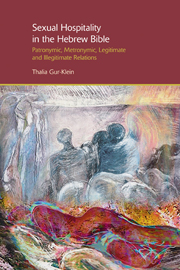 Sexual Hospitality in the Hebrew Bible
Sexual Hospitality in the Hebrew Bible My research will question how culture, history and religion loom large on forms of marriage and sexual relations in the Hebrew Bible. I shall investigate the way socio-economic concepts either legitimize or outlaw such relations. Furthermore, I shall draw on historical and anthropological perspectives to highlight Hebrew concepts of marriage and sexual relations in comparative perspectives of the biblical time. Drawing on both local and peripheral contingency, comparative data shed light on the demarcating categories that define, regulate and enforce bars on sexual relations in ancient Hebrew culture. Assuming that, since time immemorial, humans have led communal life, conceivably, groups have always generated rules to demarcate their relations. Boundaries lend a group regulating systems, coherence and identity, shackling personal drives to interrelational imperatives. Accordingly, I start my analysis by quoting from Louis Epstein's monumental work Sex Laws and Customs in Judaism: ‘There is rarely a race so primitive but it has a code of sex morality’ (Epstein [1948] 1967: 3).
Atavist cultures derive legitimacy for sexual relations from mutual consent between families or groups. By inference, women may be protected by their guardians but deprived of sexual autonomy, while claiming recourse to their sexuality of their own accord may lead to social vulnerability and exposure. The modern mind is saddled with the past. However, our contemporary perception of sexuality has divorced itself from ancient codes in many ways but our conceptualization of sexuality is still confined to a code of legitimate behaviour, albeit on different concepts.
To save this book to your Kindle, first ensure [email protected] is added to your Approved Personal Document E-mail List under your Personal Document Settings on the Manage Your Content and Devices page of your Amazon account. Then enter the ‘name’ part of your Kindle email address below. Find out more about saving to your Kindle.
Note you can select to save to either the @free.kindle.com or @kindle.com variations. ‘@free.kindle.com’ emails are free but can only be saved to your device when it is connected to wi-fi. ‘@kindle.com’ emails can be delivered even when you are not connected to wi-fi, but note that service fees apply.
Find out more about the Kindle Personal Document Service.
To save content items to your account, please confirm that you agree to abide by our usage policies. If this is the first time you use this feature, you will be asked to authorise Cambridge Core to connect with your account. Find out more about saving content to Dropbox.
To save content items to your account, please confirm that you agree to abide by our usage policies. If this is the first time you use this feature, you will be asked to authorise Cambridge Core to connect with your account. Find out more about saving content to Google Drive.